- Calendar
- Online Ticket Sales
- Access
- JA
- EN
Essays in Idleness:
Enjoying Classical Literature Through Art
June 11 to July 21 2014
Section 1
Kenko and Essays in Idleness
Kenko, who was born in about 1283, was the son of Urabe Kaneaki, a Shinto priest of modest rank. In his early twenties, Kenko served the Emperor Go-Nijo (1285-1308) as a chamberlain, but by the time he turned thirty, he had already retired into religion. It is said that he lived past his seventieth birthday, but the historical record is meager and little is reliably known about him.
During his lifetime, Kenko was known as a poet whose master was Nijo Tameyo(1250-1338). No contemporary record exists, however, of Kenko as the author of Essays in Idleness (Tsurezuregusa), and no trace existed, for a considerable time, of appreciation for that work. It is still not clear when and how Essays in Idleness was composed.
Over a century after Kenko completed Essays in Idleness in the closing years of the Kamakura period (probably around 1333), the work began to gain a sympathetic reception among the poets and linked-verse masters of the Muromachi period (1336-1573). In the Edo period (1600-1868), with the shogunate’s encouragement of scholarship and the development of printing technologies, the essays swiftly captured a wide readership.
This section of the exhibition addresses the character of Kenko and traces the history of the reception of Essays in Idleness to its elevation to its current status as a masterpiece of Japanese classical literature.
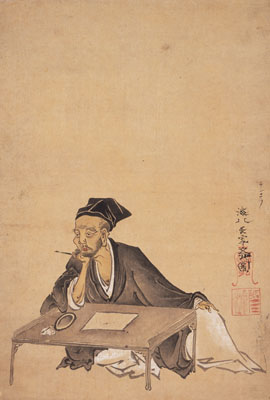
Copy of Portrait of Kenko Hoshi
Original by Kaiho Yusetsu
One hanging scroll
Edo Period (17th Century)
Private collection
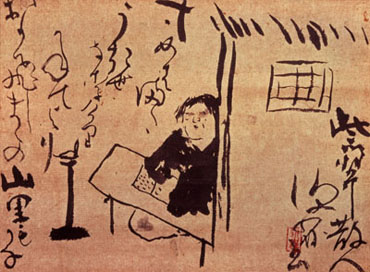
Portrait of Kenko Hoshi
By Ogata Kenzan
One hanging scroll
Edo Period (late 17th Century to early 18th Century)
Private collection
Section 2
Painting Essays in Idlenes
With the publication of print editions of Essays in Idleness and commentaries on the text in the Edo period, the book swiftly captured a wide readership. As the essays gained popularity, artists started to create illustrations. One result was the rise of the Tsurezure-e.
That term refers to paintings and drawings inspired by the Tsurezuregusa essays and parallels the terms Genji-e, depictions of the Tale of Genji (Genji Monogatari), and Ise-e, depictions of the Tales of Ise (Ise Monogatari).
The annotated Nagusamigusa is an example of Tsurezure-e worthy of special mention.With its 157 illustrations, the Nagusamigusa became an influential source of motifs and designs for other Tsurezure-e.
Many Tsurezure-e have, however, no discernible connection with the Nagusamigusa.Appreciation of classical literature flourished in the early Edo period in the context of a trend for reviving classical culture in which the Emperor Go-Mizunoo (1596-1680) played a central role. With a rapid increase in demand for paintings with themes taken from classical literature, large numbers of Tsurezure-e were produced in this period.
Responding to that growing demand, several schools of painting, including the Kano, Tosa, and Sumiyoshi schools, turned to creating their own Tsurezure-e. As a result, there is no discernible correlation in style or motif between their works; artists freely chose which episodes to depict. They also worked in a variety of formats, from handscrolls and folding screens to albums of paintings and illustrated books in response to demand. This section introduces the many faces of Tsurezure-e.

Essays in Idleness (Tsurezuregusa) Folding Screen
Attributed to Sumiyoshi Jokei
Pair of six-fold screens(right-hand screen)
Edo Period (17th Century)
Atsuta Jingu

Essays in Idleness (Tsurezuregusa) Folding Screen
Attributed to Sumiyoshi Jokei
Pair of six-fold screens(left-hand screen)
Edo Period (17th Century)
Atsuta Jingu
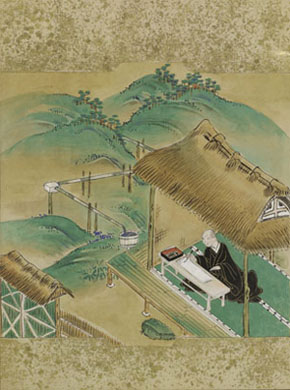
Nara-Ehon (Nara picture book) of Essays in Idleness (Tsurezuregusa)
Volume one out of five(section)
Edo Period (17th Century)
Fumi Bunko (Fumi Library)
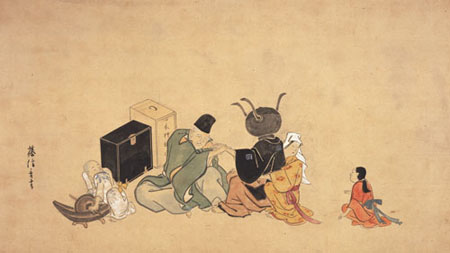
Omuro (Ninna-ji) Priests, from Essays in Idleness (Tsurezuregusa)
By Hanabusa Itcho
One hanging scroll
Edo Period (late 17th Century)
Private collection
Section 3
Reading Essays in Idleness
The Suntory Museum recently acquired the twenty volumes of Tsurezuregusa handscrolls by Kaiho Yusetsu for its collection. For Tsurezure-e, artists usually painted several scenes, having selected popular episodes from the Essays in Idleness or episodes that readily lent themselves to depiction. The Kaiho Yusetsu Tsurezuregusa handscrolls are particularly valuable because they illustrate the book in its entirety, and both the text and the pictures are complete.
Many commentaries have attempted to devise methods of reading Essays in Idleness by dividing the book into short passages. The set of 244 episodes into which it is now conventionally divided is the work of Kitamura Kigin, poet, actor and classical scholar. He produced the 244-episode division of the Tsurezuregusa Mondansho, which was published in 1667.
Since the subdivision of the Tsurezuregusa handscrolls by Kaiho Yusetsu nearly matches that in the Tsurezuregusa Mondansho, scholars have long assumed that these scrolls date from after 1667. It has since been confirmed, however, that the division of episodes in scrolls correlates with not only in the 1645 edition of Essays in Idleness but also in the one published in the the Kan'ei era (1624-45). Thus, it is possible that the handscrolls were created probably before 1667. That dating makes these hand scrolls even more valuable as examples of work predating the Nagusamigusa (1652), a mixture of pictures and commentary long regarded as the earliest pictorial representation of Essays in Idleness.
This section marks the first public display of the newly acquired handscrolls and offers a must-see experience of famous scenes from Essays in Idleness.
Essays in Idleness (Tsurezuregusa) Picture Scroll,Volume1
By Kaiho Yusetsu
Scroll one of twenty(section)
Edo Period (late 17th Century)
Suntory Museum of Art
Section 4
The Works of Kaiho Yusetsu and the Tsurezuregusa Handscrolls
Kaiho Yusetsu (1598-1677), who painted the twenty-volume Tsurezuregusa hand scrolls, was the son of Kaiho Yusho (1533-1615), a leading Momoyama-period painter. Yusetsu, who was only eighteen when his father died, went through a period of hardship when he earned a living as a commercial artist operating an eya, a shop that produced and sold a variety of painted goods to order, because the Kaiho School his father had founded still lacked the broad-based support necessary for stability as a school of painters.
Then Kasuga-no-Tsubone (1579-1643), who had served as wet nurse to Tokugawa Iemitsu, the third shogun, recommended Yusetsu to the shogun to repay the kindness his father, Yusho, had shown her, and Yusetsu found himself in the position of a salaried artist in the service of Iemitsu.
Yusetsu made use of his experience of producing diverse works to order at the eya to develop a wide repertoire including paintings of famous places (meisho-e), paintings of the origin or history of temples or shrines (engi-e), Buddhist paintings, and large paintings to decorate walls, screens or sliding doors (kinpeki shoheiga), which were created using strong mineral pigments applied over gold backgrounds. This section introduces Yusetsu’s oeuvre through a wide range of examples of styles and themes, exploring the nature of the artist who created the twenty volumes of the Tsurezuregusa handscrolls.
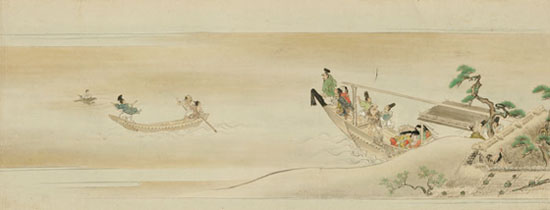
History of Soji-ji Picture Scroll
By Kaiho Yusetsu
One volume(section)
Edo Period (17th Century)
Soji-ji, the 22nd temple on the Saigoku Pilgrimage route, Osaka
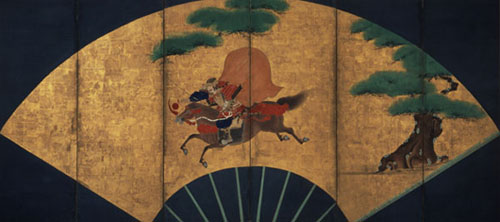
The Battle of Ichinotani Folding Screen
By Kaiho Yusetsu
Pair of six-fold screens(right-hand screen)
Edo Period (17th Century)
Saitama Prefectural Museum of History and Folklore
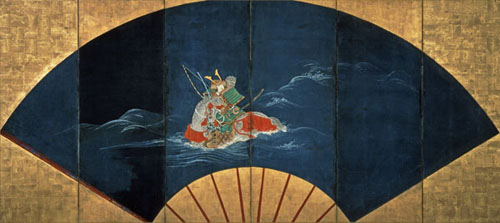
The Battle of Ichinotani Folding Screen
By Kaiho Yusetsu
Pair of six-fold screens (left-hand screen)
Edo Period (17th Century)
Saitama Prefectural Museum of History and Folklore
*Unauthorized reproduction or use of texts or images from this site is prohibited.
2025 January
- Exhibition
- Closed
- Tea Ceremony
- Mon
- Tue
- Wed
- Thu
- Fri
- Sat
- Sun
- 1
- 2
- 3
- 4
- 5
- 6
- 7
- 8
- 9
- 10
- 11
- 12
- 13
- 14
- 15
- 16
- 17
- 18
- 19
- 20
- 21
- 22
- 23
- 24
- 25
- 26
- 27
- 28
- 29
- 30
- 31
2025 February
- Exhibition
- Closed
- Tea Ceremony
- Mon
- Tue
- Wed
- Thu
- Fri
- Sat
- Sun
- 1
- 2
- 3
- 4
- 5
- 6
- 7
- 8
- 9
- 10
- 11
- 12
- 13
- 14
- 15
- 16
- 17
- 18
- 19
- 20
- 21
- 22
- 23
- 24
- 25
- 26
- 27
- 28
2025 March
- Exhibition
- Closed
- Tea Ceremony
- Mon
- Tue
- Wed
- Thu
- Fri
- Sat
- Sun
- 1
- 2
- 3
- 4
- 5
- 6
- 7
- 8
- 9
- 10
- 11
- 12
- 13
- 14
- 15
- 16
- 17
- 18
- 19
- 20
- 21
- 22
- 23
- 24
- 25
- 26
- 27
- 28
- 29
- 30
- 31
2025 April
- Exhibition
- Closed
- Tea Ceremony
- Mon
- Tue
- Wed
- Thu
- Fri
- Sat
- Sun
- 1
- 2
- 3
- 4
- 5
- 6
- 7
- 8
- 9
- 10
- 11
- 12
- 13
- 14
- 15
- 16
- 17
- 18
- 19
- 20
- 21
- 22
- 23
- 24
- 25
- 26
- 27
- 28
- 29
- 30
2025 May
- Exhibition
- Closed
- Tea Ceremony
- Mon
- Tue
- Wed
- Thu
- Fri
- Sat
- Sun
- 1
- 2
- 3
- 4
- 5
- 6
- 7
- 8
- 9
- 10
- 11
- 12
- 13
- 14
- 15
- 16
- 17
- 18
- 19
- 20
- 21
- 22
- 23
- 24
- 25
- 26
- 27
- 28
- 29
- 30
- 31
2025 June
- Exhibition
- Closed
- Tea Ceremony
- Mon
- Tue
- Wed
- Thu
- Fri
- Sat
- Sun
- 1
- 2
- 3
- 4
- 5
- 6
- 7
- 8
- 9
- 10
- 11
- 12
- 13
- 14
- 15
- 16
- 17
- 18
- 19
- 20
- 21
- 22
- 23
- 24
- 25
- 26
- 27
- 28
- 29
- 30
2025 July
- Exhibition
- Closed
- Tea Ceremony
- Mon
- Tue
- Wed
- Thu
- Fri
- Sat
- Sun
- 1
- 2
- 3
- 4
- 5
- 6
- 7
- 8
- 9
- 10
- 11
- 12
- 13
- 14
- 15
- 16
- 17
- 18
- 19
- 20
- 21
- 22
- 23
- 24
- 25
- 26
- 27
- 28
- 29
- 30
- 31
2025 August
- Exhibition
- Closed
- Tea Ceremony
- Mon
- Tue
- Wed
- Thu
- Fri
- Sat
- Sun
- 1
- 2
- 3
- 4
- 5
- 6
- 7
- 8
- 9
- 10
- 11
- 12
- 13
- 14
- 15
- 16
- 17
- 18
- 19
- 20
- 21
- 22
- 23
- 24
- 25
- 26
- 27
- 28
- 29
- 30
- 31
2025 September
- Exhibition
- Closed
- Tea Ceremony
- Mon
- Tue
- Wed
- Thu
- Fri
- Sat
- Sun
- 1
- 2
- 3
- 4
- 5
- 6
- 7
- 8
- 9
- 10
- 11
- 12
- 13
- 14
- 15
- 16
- 17
- 18
- 19
- 20
- 21
- 22
- 23
- 24
- 25
- 26
- 27
- 28
- 29
- 30
2025 October
- Exhibition
- Closed
- Tea Ceremony
- Mon
- Tue
- Wed
- Thu
- Fri
- Sat
- Sun
- 1
- 2
- 3
- 4
- 5
- 6
- 7
- 8
- 9
- 10
- 11
- 12
- 13
- 14
- 15
- 16
- 17
- 18
- 19
- 20
- 21
- 22
- 23
- 24
- 25
- 26
- 27
- 28
- 29
- 30
- 31
2025 November
- Exhibition
- Closed
- Tea Ceremony
- Mon
- Tue
- Wed
- Thu
- Fri
- Sat
- Sun
- 1
- 2
- 3
- 4
- 5
- 6
- 7
- 8
- 9
- 10
- 11
- 12
- 13
- 14
- 15
- 16
- 17
- 18
- 19
- 20
- 21
- 22
- 23
- 24
- 25
- 26
- 27
- 28
- 29
- 30
2025 December
- Exhibition
- Closed
- Tea Ceremony
- Mon
- Tue
- Wed
- Thu
- Fri
- Sat
- Sun
- 1
- 2
- 3
- 4
- 5
- 6
- 7
- 8
- 9
- 10
- 11
- 12
- 13
- 14
- 15
- 16
- 17
- 18
- 19
- 20
- 21
- 22
- 23
- 24
- 25
- 26
- 27
- 28
- 29
- 30
- 31
2026 January
- Exhibition
- Closed
- Tea Ceremony
- Mon
- Tue
- Wed
- Thu
- Fri
- Sat
- Sun
- 1
- 2
- 3
- 4
- 5
- 6
- 7
- 8
- 9
- 10
- 11
- 12
- 13
- 14
- 15
- 16
- 17
- 18
- 19
- 20
- 21
- 22
- 23
- 24
- 25
- 26
- 27
- 28
- 29
- 30
- 31
2026 February
- Exhibition
- Closed
- Mon
- Tue
- Wed
- Thu
- Fri
- Sat
- Sun
- 1
- 2
- 3
- 4
- 5
- 6
- 7
- 8
- 9
- 10
- 11
- 12
- 13
- 14
- 15
- 16
- 17
- 18
- 19
- 20
- 21
- 22
- 23
- 24
- 25
- 26
- 27
- 28
2026 March
- Exhibition
- Closed
- Mon
- Tue
- Wed
- Thu
- Fri
- Sat
- Sun
- 1
- 2
- 3
- 4
- 5
- 6
- 7
- 8
- 9
- 10
- 11
- 12
- 13
- 14
- 15
- 16
- 17
- 18
- 19
- 20
- 21
- 22
- 23
- 24
- 25
- 26
- 27
- 28
- 29
- 30
- 31
2026 April
- Exhibition
- Closed
- Mon
- Tue
- Wed
- Thu
- Fri
- Sat
- Sun
- 1
- 2
- 3
- 4
- 5
- 6
- 7
- 8
- 9
- 10
- 11
- 12
- 13
- 14
- 15
- 16
- 17
- 18
- 19
- 20
- 21
- 22
- 23
- 24
- 25
- 26
- 27
- 28
- 29
- 30
2026 May
- Exhibition
- Closed
- Mon
- Tue
- Wed
- Thu
- Fri
- Sat
- Sun
- 1
- 2
- 3
- 4
- 5
- 6
- 7
- 8
- 9
- 10
- 11
- 12
- 13
- 14
- 15
- 16
- 17
- 18
- 19
- 20
- 21
- 22
- 23
- 24
- 25
- 26
- 27
- 28
- 29
- 30
- 31
2026 June
- Exhibition
- Closed
- Mon
- Tue
- Wed
- Thu
- Fri
- Sat
- Sun
- 1
- 2
- 3
- 4
- 5
- 6
- 7
- 8
- 9
- 10
- 11
- 12
- 13
- 14
- 15
- 16
- 17
- 18
- 19
- 20
- 21
- 22
- 23
- 24
- 25
- 26
- 27
- 28
- 29
- 30
2026 July
- Exhibition
- Closed
- Mon
- Tue
- Wed
- Thu
- Fri
- Sat
- Sun
- 1
- 2
- 3
- 4
- 5
- 6
- 7
- 8
- 9
- 10
- 11
- 12
- 13
- 14
- 15
- 16
- 17
- 18
- 19
- 20
- 21
- 22
- 23
- 24
- 25
- 26
- 27
- 28
- 29
- 30
- 31
2026 August
- Exhibition
- Closed
- Mon
- Tue
- Wed
- Thu
- Fri
- Sat
- Sun
- 1
- 2
- 3
- 4
- 5
- 6
- 7
- 8
- 9
- 10
- 11
- 12
- 13
- 14
- 15
- 16
- 17
- 18
- 19
- 20
- 21
- 22
- 23
- 24
- 25
- 26
- 27
- 28
- 29
- 30
- 31
2026 September
- Exhibition
- Closed
- Mon
- Tue
- Wed
- Thu
- Fri
- Sat
- Sun
- 1
- 2
- 3
- 4
- 5
- 6
- 7
- 8
- 9
- 10
- 11
- 12
- 13
- 14
- 15
- 16
- 17
- 18
- 19
- 20
- 21
- 22
- 23
- 24
- 25
- 26
- 27
- 28
- 29
- 30
2026 October
- Exhibition
- Closed
- Mon
- Tue
- Wed
- Thu
- Fri
- Sat
- Sun
- 1
- 2
- 3
- 4
- 5
- 6
- 7
- 8
- 9
- 10
- 11
- 12
- 13
- 14
- 15
- 16
- 17
- 18
- 19
- 20
- 21
- 22
- 23
- 24
- 25
- 26
- 27
- 28
- 29
- 30
- 31
2026 November
- Exhibition
- Closed
- Mon
- Tue
- Wed
- Thu
- Fri
- Sat
- Sun
- 1
- 2
- 3
- 4
- 5
- 6
- 7
- 8
- 9
- 10
- 11
- 12
- 13
- 14
- 15
- 16
- 17
- 18
- 19
- 20
- 21
- 22
- 23
- 24
- 25
- 26
- 27
- 28
- 29
- 30
2026 December
- Exhibition
- Closed
- Mon
- Tue
- Wed
- Thu
- Fri
- Sat
- Sun
- 1
- 2
- 3
- 4
- 5
- 6
- 7
- 8
- 9
- 10
- 11
- 12
- 13
- 14
- 15
- 16
- 17
- 18
- 19
- 20
- 21
- 22
- 23
- 24
- 25
- 26
- 27
- 28
- 29
- 30
- 31
